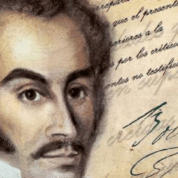In the Joint Declaration of the ALBA (2004), the document states that, "Only a broad Latin Americanist vision, which acknowledges the impossibility of our countries' developing and being truly independent in an isolated manner, will be capable of achieving what Bolivar called for ... 'to see the formation in the Americas of the greatest nation in the world, not so much for its size and riches as for its freedom and glory' and that Marti conceived of as 'Our America' to differentiate from the other America, the expansionist one with imperialist appetites."

Bolivar's historic document, which was a response to a letter, was written during his self-imposed exile in Jamaica and solidified the shared experience of colonialism and the quest for political independence between Caribbean nations and Latin America.
Simon Bolivar was born today, July 24, 1783, the Latin American independence leader led the anti-colonial forces that liberated much of the Americas and its people from Spanish rule.
RELATED:
'Venezuela, Heart of America' Social Media Campaign Launches
He wrote the so-called “Jamaica Letter” in 1815, where he elaborates more broadly on his political theories to explain the causes for the fall of the Second Republic of Venezuela within the broader context of liberation struggles in the region.
”As soon as we are strong and under the guidance of a liberal nation which will lend us her protection, we will achieve accord in cultivating the virtues and talents that lead to glory. Then will we march majestically toward that great prosperity for which South America is destined,” Bolivar wrote. “Then will those sciences and arts which, born in the East, have enlightened Europe, wing their way to a free Colombia, which will cordially bid them welcome.”
Evidently inspired by the political developments in “enlightened Europe,” the general nonetheless argued that European – namely Spanish – colonialism fundamentally deprived the peoples of the Americas of economic opportunity and equality, whose ideas would eventually prompt independence movements across the region.
Many of the 21st-century trends towards regional integration – evident in regional organizations Bolivarian Alliance for the Peoples of Our America, Union of South American Nations and the Community of Latin American and Caribbean States – were expressed in Bolivar’s vision of creating a unified Latin America based on the tenets of sovereignty and anti-colonialism.
The ideas outlined in the “Jamaica Letter” influenced the policies of several democratically-elected leaders including late Venezuelan President Hugo Chavez, to promote regional unity through the strengthening and joining of regional integration mechanisms such as ALBA and CELAC.
RELATED:
Simon Bolivar's Life to Be Depicted in an Animated Short
The Jamaica Letter obtained much of its revolutionary content from Haiti, which became the first modern colony to win its independence in 1804 – an event that had significant influence on the thinking of independence leaders like Bolivar and Francisco de Miranda.
In essence, the letter laid the foundations for political solidarity and cooperation between Latin America and the Caribbean, which has enhanced substantially as a result of initiatives such as CELAC and PetroCaribe.
Chavez, one of the founders of ALBA, PetroCaribe and CELAC, relentlessly promoted regional unity and cooperation, even as these became objects of attacks from opposition groups at home.
“Here in Mexico, a document, a commitment, the creation of a Latin America and Caribbean body, it’s not the United States, it’s not Canada ... Now, from Mexico we can say that we have revived the dream and project of Bolivar,” President Chavez stated during the CELAC inauguration.
Now more than ever — as a right-wing political shift in the region tries to do away with the leftist gains of the last years — the content of the Jamaica Letter, the calls toward a common identity which paves the way to regional unity and independence, is more urgent than ever to uphold and defend.